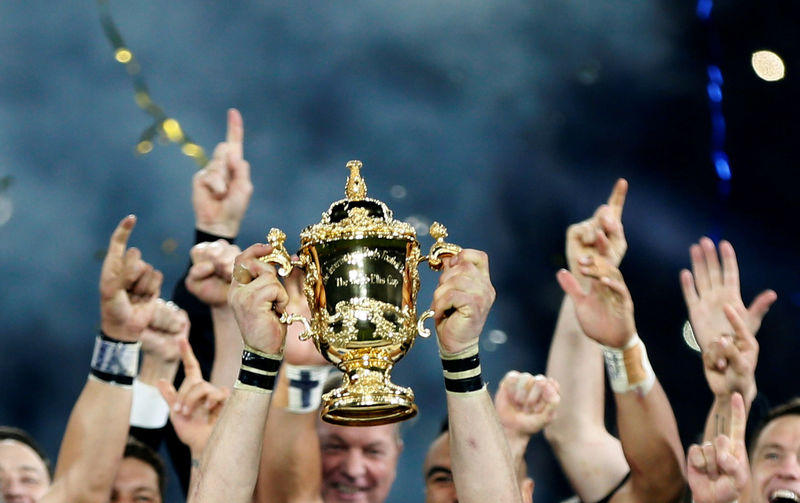By Mitch Phillips
LONDON (Reuters) - The 2023 Rugby World Cup is set to be held in South Africa after the Board of the sport's governing body recommended their bid ahead of Ireland and France on Tuesday but both losing nations vowed to fight on.
World Rugby's Council could still opt for any of the three bids when it votes on Nov. 15 but is expected to rubber-stamp the recommendation and some unions, including New Zealand, have indicated that they will follow the Board's choice.
Japan will host the next tournament in 2019, the first in Asia.
Ireland's joint Republic and Northern Irish bid had been the bookmakers' favourites having never been the main host before while France were the outsiders having staged the tournament in 2007.
Both, however, were outscored in the evaluation report where South Africa received an overall score of 78.97 percent to 75.88 for France and 72.25 for Ireland on a selection of weighted criteria.
South Africa hosted the 1995 World Cup against an extraordinary emotional, social and political backdrop after the country had missed the first two tournaments due to the sporting ban over apartheid.
The sight of Nelson Mandela in a Springbok shirt presenting the Webb Ellis Cup to Francois Pienaar as South Africa triumphed
on home soil is probably the most iconic image in the tournament's history.
But though unashamedly using that tournament to strengthen their bid, they scored well across much more prosaic issues such as transport, technology and match venues, with the availability of stadiums built for the 2010 football World Cup a major plus.
"We told the World Rugby Council that we would deliver a triple win tournament – a win for the game with record receipts; a win for the fans with an unforgettable tournament in a bucket-list destination and, most importantly, a win for the players with the most athlete-centric event in the tournament’s history," SA Rugby CEO Jurie Roux said.
GREATER TRANSPARENCY
World Rugby and Rugby World Cup Limited Chairman Bill Beaumont said in a statement: "This is the first Rugby World Cup host selection to take place following a complete redesign of the bidding process to promote greater transparency and maximise World Rugby's hosting objectives.
"The comprehensive and independently scrutinised evaluation reaffirmed that we have three exceptional bids but it also identified South Africa as a clear leader."
The Irish finished last in all but one of the five main criteria and lost out badly on transport and information technology.
Amid the 220-page report, the following criticism of the Irish bid's technology plans stood out.
"The amount of upgrade work required introduces complexity and therefore a significant risk factor that is not is not inherent in the other two bids," it said.
They have not given up yet, however.
"While it is disappointing not to have received the initial recommendation there is nothing in the report which is insurmountable and this is certainly not the end of the road," Dick Spring, Ireland's bid committee chairman, said.
France also believe they are still in the race with South Africa.
"As of today, a final is taking shape in which France and South Africa will go head to head," said Bernard Laporte, President of the FFR.
"France was placed in top position on the main criterion: the financial offer and the guarantees.
"In this final straight, we are more mobilised and determined than ever to convince the voting federations that France is the best choice."
The three bidding countries will not take part in the Nov. 15 vote. The remaining SANZAR and Six Nations unions will have three votes each of a total of 39, with the rest made up from the six regional associations and smaller rugby countries.

A minimum of 20 votes will be needed to secure the hosting rights.